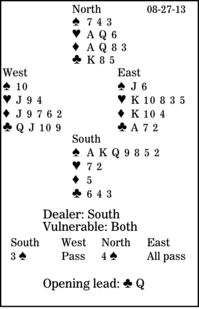Bridge column, August 27: Guesses are not often guesses

At the bridge table, the prescription for success is trying not to have to guess what to do, but what will have mathematically the best chance to succeed.
In this deal, South is in four spades. West leads the club queen. Since East is marked with the club ace, declarer plays low from the board at tricks one and two, but still loses the first three tricks. East then shifts to the spade six. After drawing trumps, how should declarer continue?
South opened three spades, showing a respectable suit, some 6-10 high-card points and about seven winners. Here, North would have done well to respond three no-trump, but if South's suit needed establishing, that contract could have gone down several tricks. Raising to four spades was "normal."
South has only nine winners: seven spades, one heart and one diamond. At first glance, it looks as though he needs one of the red-suit finesses to work. But which one should he take? It seems to be a pure guess. However, he can improve his odds slightly.
Declarer should play a diamond to dummy's ace, ruff a low diamond in his hand, return to dummy with a trump, and ruff another diamond. Here, the king drops, establishing dummy's queen and allowing South to claim. But if the diamond king is still out there somewhere, declarer cashes the rest of his trumps, planning to take the heart finesse at trick 12.
** ** **
COPYRIGHT: 2013, UNITED FEATURE SYNDICATE
DISTRIBUTED BY UNIVERSAL UCLICK FOR UFS

